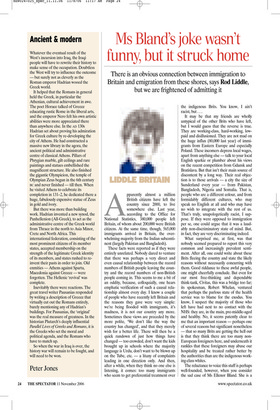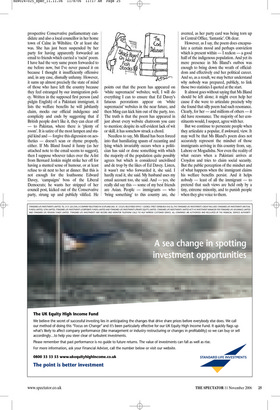Ms Bland’s joke wasn’t funny, but it struck home
There is an obvious connection between immigration to Britain and emigration from these shores, says Rod Liddle, but we are frightened of admitting it Apparently almost a million British citizens have left the country since 2000, to live somewhere else. Last year, according to the Office for National Statistics, 380,000 people left Britain, of whom about 200,000 were British citizens. At the same time, though, 565,000 immigrants arrived in Britain, the overwhelming majority from the Indian subcontinent (largely Pakistan and Bangladesh).
These facts were reported as if they were entirely unrelated. Nobody dared to venture that there was perhaps a very direct and even causal relationship between the record numbers of British people leaving the country and the record numbers of non-British people coming in. This seems to me a bit of an oddity, because, colloquially, one hears emphatic verification of such a causal relationship almost every day. I know a couple of people who have recently left Britain and the reasons they gave were very simple: we’re being flooded with immigrants, it’s madness, it is not our country any more. Sometimes these views are preceded by the more polite, ‘We don’t like the way the country has changed’, and that they merely wish for a better life. There will then be a quick rundown of just how things have changed — too crowded, don’t want the kids brought up in schools where the majority language is Urdu, don’t want to be blown up on the Tube, etc. — a litany of complaints leading in one direction only. And then, after a while, when they think no one else is listening, it comes: too many immigrants who seem to get preferential treatment over the indigenous Brits. You know, I ain’t racist, but ...
It may be that my friends are wholly untypical of the other Brits who have left, but I would guess that the reverse is true. They are working-class, hard-working, lowpaid and disillusioned. They are not mad on the huge influx (80,000 last year) of immigrants from Eastern Europe and especially Poland. These incomers depress local wages, apart from anything else — talk to your local English sparkie or plumber about his views on the recent competition from Gdansk and Bratislava. But that isn’t their main source of discontent by a long way. Their real objection is to those arrivals — a city the size of Sunderland every year — from Pakistan, Bangladesh, Nigeria and Somalia. That is, people who are a different colour, and from formidably different cultures, who may speak no English at all and who may have no wish to integrate with the rest of us. That’s truly, unapologetically racist, I suppose. If they were opposed to immigration per se, one could argue that it was a laudably non-discriminatory state of mind. But, in fact, they are very discriminating indeed.
What surprised me, at first, was that nobody seemed prepared to report this very common and increasingly prevalent sentiment. After all, one could write about these Brits fleeing the country and state the likely reasons without necessarily concurring with them. Good riddance to these awful people, one might cheerfully conclude. But even for our most free-thinking and dependable think-tank, Civitas, this was a bridge too far; its spokesman, Robert Whelan, ventured that perhaps the parlous state of the health service was to blame for the exodus. You know, I suspect the majority of those who left have had next to no contact with the NHS: they are, in the main, pre-middle-aged and healthy. No, it seems patently clear to me that an important reason — perhaps one of several reasons but significant nonetheless — that so many Brits are getting the hell out is that they think there are too many nonEuropean foreigners here, and underneath it rankles that these foreigners may abuse our hospitality and be treated rather better by the authorities than are the indigenous working-class whites.
The reluctance to voice this stuff is perhaps well-founded, however, when you consider the sad case of Ms Ellenor Bland. She is a prospective Conservative parliamentary candidate and also a local councillor in her home town of Calne in Wiltshire. Or at least she was. She has just been suspended by her party for having apparently forwarded an email to friends which carried a ‘racist’ poem. I have had the very same poem forwarded to me before now, but I’ve never passed it on because I thought it insufficiently offensive and, in any case, dismally unfunny. However, it sums up almost precisely the state of mind of those who have left the country because they feel estranged by our immigration policy. Written in the supposed first person (and pidgin English) of a Pakistani immigrant, it lists the welfare benefits he will jubilantly claim, mocks our official indulgence and complicity and ends by suggesting that if British people don’t like it, they can clear off — to Pakistan, where there is ‘plenty of room’. It is satire of the most lumpen and stupid kind and — forgive this digression on aesthetics — doesn’t scan or rhyme properly, either. If Ms Bland found it funny (as her attached note to the email seems to suggest), then I suppose whoever takes over the A-list from Bernard Jenkin might strike her off for having a stunted sense of humour, or at least refuse to sit next to her at dinner. But this is not enough for the loathsome Edward Davey, ‘campaigns’ boss of the Liberal Democrats; he wants her stripped of her council post, kicked out of the Conservative party, strung up and publicly vilified. He points out that the poem has appeared on ‘white supremacist’ websites; well, I will do everything I can to ensure that Ed Davey’s fatuous perorations appear on ‘white supremacist’ websites in the near future, and then Ming can kick him out of the party, too. The truth is that the poem has appeared in just about every website chatroom you care to mention; despite its self-evident lack of wit or skill, it has somehow struck a chord.
Needless to say, Ms Bland has been forced into that humiliating spasm of recanting and lying which invariably occurs when a politician has said or done something with which the majority of the population quite possibly agrees but which is considered uncivilised and de trop by the likes of Ed Davey. Listen, it wasn’t me who forwarded it, she said. I hardly read it, she said. My husband uses my email account too, she said. And — yes, she really did say this — some of my best friends are Asian. People — immigrants — who ‘bring something’ to this country are, she averred, as her party card was being torn up in Central Office, ‘fantastic’. Oh dear.
However, as I say, the poem does encapsulate a certain mood and perhaps conviction which is present within — I reckon — a good half of the indigenous population. And yet its mere presence in Ms Bland’s outbox was enough to bring down the wrath of officialdom and effectively end her political career. And so, as a result, we may better understand why nobody was prepared, publicly, to link those two statistics I quoted at the start.
It almost goes without saying that Ms Bland should be left alone; it might even help her cause if she were to articulate precisely why she found that silly poem had such resonance. Clearly, for her — and millions of others — it did have resonance. The majority of her constituents would, I suspect, agree with her.
But we continue to persecute people when they articulate a popular, if awkward, view. It may well be that Ms Bland’s poem does not accurately represent the mindset of those immigrants arriving in this country from, say, Lahore or Mogadishu. Nor even the reality of what occurs when a Pakistani arrives at Croydon and tries to claim social security. But the public perception of the mindset and of what happens when the immigrant claims his welfare benefits persist. And it helps nobody — least of all the immigrant — to pretend that such views are held only by a tiny, extreme minority, and to punish people when they give voice to them.



































































































 Previous page
Previous page